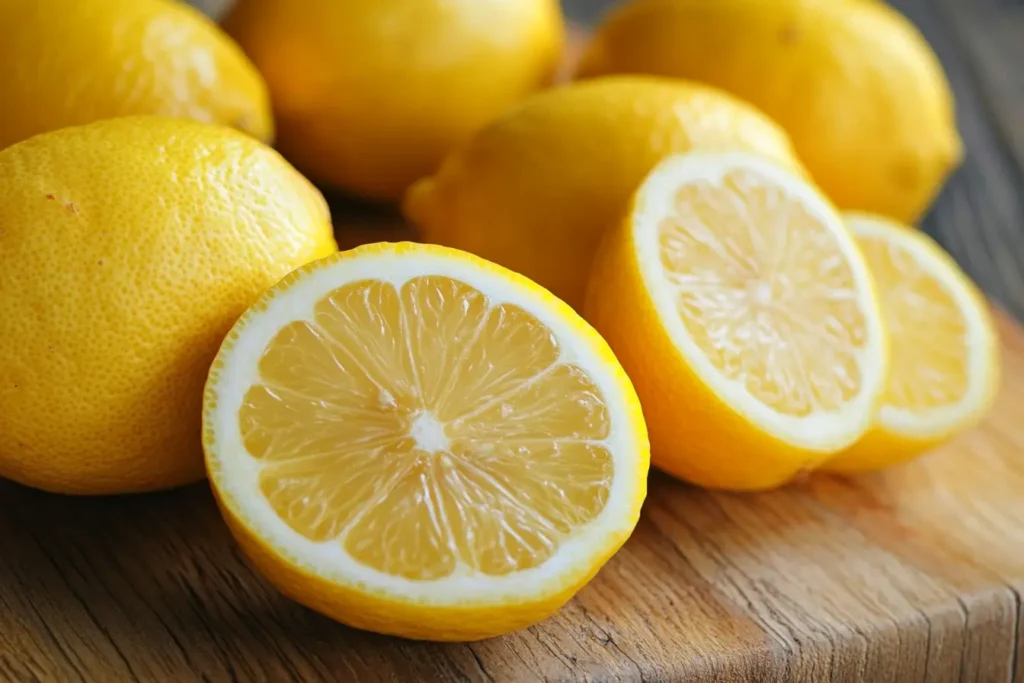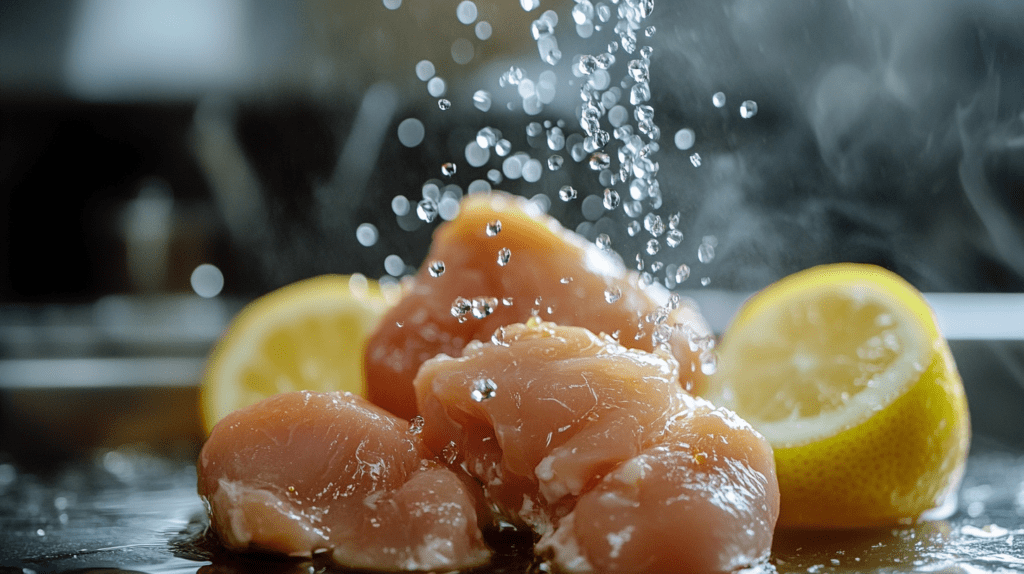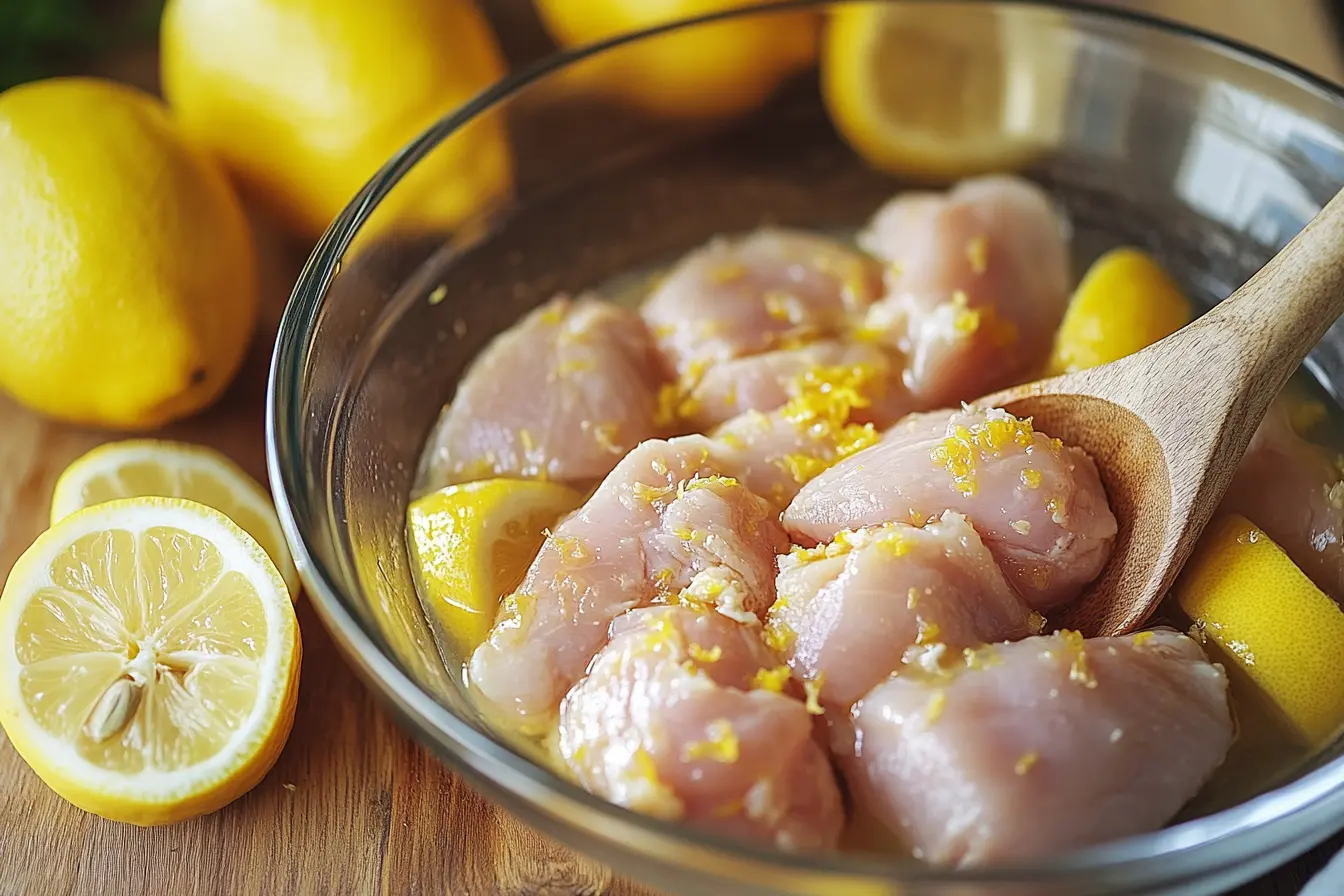Introduction
Does Lemon Juice Cook Raw Chicken? Lemon juice has long been a staple in kitchens around the world, thanks to its ability to enhance flavors, tenderize meats, and even preserve food. But when it comes to cooking raw chicken, does lemon juice really do the job? In this article, we’ll explore the science behind how lemon juice interacts with raw chicken, examine its culinary benefits, and uncover whether it’s a safe and reliable cooking method. With a focus on safety, chemistry, and practical uses, you’ll walk away with a clear understanding of what lemon juice can—and cannot—do when it comes to preparing chicken.
Introduction to the Topic
What Does “Cooking” Mean in Culinary Terms?
Cooking is often associated with heat, but in its broadest sense, it involves any process that transforms raw food into something more palatable, digestible, or safe to eat. Heat-based methods like frying or baking denature proteins, making food tender and flavorful. On the other hand, certain non-thermal techniques, such as curing or marinating, achieve similar effects without heat. This raises the intriguing question: Can lemon juice really “cook” raw chicken?
Overview of Lemon Juice’s Properties
Lemon juice, packed with citric acid, is a highly acidic ingredient that plays a pivotal role in marination. Its acidity alters the texture of proteins, which explains why it’s a go-to tenderizing agent. Additionally, its natural enzymes and tangy flavor make it a versatile choice for enhancing a dish’s taste. But does this acid mimic the full effects of traditional cooking methods, or does it just scratch the surface?
How Lemon Juice Affects Chicken
The Chemistry of Lemon Juice
Lemon juice owes its power to citric acid, a naturally occurring compound that interacts with proteins in meat. When raw chicken is exposed to lemon juice, the acid begins breaking down the proteins’ bonds. This process, called denaturation, causes the meat to appear opaque and firmer—changes we usually associate with heat-based cooking. But here’s the kicker: while lemon juice modifies the texture, it doesn’t achieve the high temperatures needed to kill harmful bacteria.
On a chemical level, the acid rearranges protein structures, leading to visible changes. Unlike heat, which fully unfolds proteins and ensures safety, acid-based denaturation is only superficial. So, while the chicken may look “cooked” to the eye, it remains raw beneath the surface.

How Acidity Changes Chicken Texture
When marinated in lemon juice, chicken becomes noticeably more tender. This is because the acid breaks down tough muscle fibers, making the meat easier to chew. For this reason, lemon juice is commonly used in marinades to enhance flavor and texture simultaneously.
But there’s a limit: overexposing chicken to acid can lead to a mushy texture that’s far from appealing. This delicate balance makes understanding the role of acidity crucial for achieving optimal results in recipes.
Comparison with Heat Cooking
Heat and acid may both alter the appearance and texture of chicken, but their effects are vastly different. Cooking with heat not only denatures proteins more thoroughly but also destroys pathogens like Salmonella and Campylobacter. Lemon juice, by contrast, only affects the meat’s surface and lacks the ability to penetrate deeply enough to ensure food safety.
This distinction underscores a key point: lemon juice can tenderize and add flavor, but it cannot replace the microbial safety of proper heat cooking.
Is It Safe to “Cook” Chicken with Lemon Juice?
Microbial Safety Concerns
One of the most pressing questions about using lemon juice to “cook” raw chicken is its safety. While the citric acid in lemon juice denatures proteins and alters the chicken’s texture, it doesn’t generate the high temperatures needed to kill harmful bacteria. Pathogens such as Salmonella and Campylobacter are common in raw poultry, and they thrive unless subjected to heat above 165°F (74°C).
Relying solely on lemon juice creates a false sense of safety. The chicken might look cooked on the outside, but the interior remains a breeding ground for bacteria. To ensure food safety, lemon juice should only be used as a marination aid rather than a cooking method.
The Importance of Proper Marination Times
Marination is a balancing act. When chicken is soaked in lemon juice for short periods, the acid tenderizes the meat without significantly altering its structure. However, leaving it for too long—especially without refrigeration—can lead to several issues. Over-marination not only compromises the texture but also increases the risk of bacterial growth.
Best practices include marinating chicken in lemon juice for 30 minutes to 2 hours and always keeping it in a refrigerator. Prolonged exposure to room temperatures can encourage harmful microbes, counteracting any perceived benefits of the acid.
Risks of Partial “Cooking” with Lemon Juice
Using lemon juice to partially “cook” chicken is risky because it leaves the meat undercooked. Even though the surface proteins may appear opaque and firmer, the interior remains raw and unsafe to eat. This is why lemon-juice-treated chicken is not suitable for consumption without additional cooking.
To maximize both flavor and safety, chefs often use lemon juice as a precursor to proper cooking methods like grilling or baking. The acid can act as a tenderizer and flavor enhancer, but it’s not a standalone solution for preparing raw chicken.
Alternative Uses of Lemon Juice in Cooking

Enhancing Flavor Profiles
Lemon juice is a culinary powerhouse when it comes to elevating flavors. Its bright, tangy taste can balance rich, savory dishes or add a refreshing twist to lighter recipes. In chicken marinades, for instance, lemon juice pairs beautifully with herbs like thyme, rosemary, or cilantro, creating a vibrant flavor profile.
Beyond marination, a splash of lemon juice added at the end of cooking can brighten up soups, stir-fries, or roasted chicken dishes. Its acidity cuts through grease and adds complexity, making it an essential ingredient for chefs worldwide.
Tenderizing Meat with Acidity
Acidic ingredients like lemon juice are widely used for tenderizing tougher cuts of meat, including chicken. By breaking down muscle fibers, the acid softens the texture and makes the meat easier to chew. When combined with other marinade ingredients such as olive oil, garlic, and spices, lemon juice not only tenderizes but also infuses the meat with layers of flavor.
However, timing is key. For best results, chicken should be marinated with lemon juice for a short period—usually 30 minutes to 2 hours. Over-marination can lead to mushy, unpleasant textures, especially with delicate proteins like chicken breast.
Lemon Juice in International Cuisines
Lemon juice plays a vital role in many global cuisines. In Middle Eastern cooking, it’s a key component of dishes like Shish Tawook, where it tenderizes and flavors chicken skewers. In Southeast Asian cuisine, it’s often paired with chili, garlic, and fish sauce to create zesty marinades for grilled or stir-fried chicken.
Even outside of marination, lemon juice adds depth to salad dressings, sauces, and soups. Its versatility makes it a go-to ingredient, proving that its value goes far beyond its ability to “cook” raw chicken.
Frequently Asked Questions
Does lemon juice fully cook chicken?
No, lemon juice does not fully cook chicken. It can denature proteins on the surface, making the chicken look and feel “cooked” in certain areas. However, this process doesn’t generate the heat necessary to kill harmful bacteria. To ensure safety, chicken marinated in lemon juice must always be cooked using heat.
How long does it take for lemon juice to “cook” chicken?
Lemon juice can start altering the texture of chicken within 30 minutes to 2 hours of marination. However, this isn’t actual cooking—it’s a superficial change caused by the acid breaking down proteins. To avoid over-marination and maintain food safety, always refrigerate the chicken and never consume it raw after marinating.
Is it safe to eat lemon-juice-marinated chicken raw?
No, it’s not safe to eat lemon-juice-marinated chicken raw. While the acid in lemon juice may denature some proteins, it doesn’t kill bacteria like Salmonella or Campylobacter. Consuming raw or undercooked chicken poses a serious health risk, including foodborne illnesses.
What dishes commonly use lemon juice for marination?
Lemon juice is a popular ingredient in dishes like grilled chicken skewers, lemon herb chicken, and citrus-based salads. International cuisines often rely on lemon juice for marinating, such as Tandoori Chicken in Indian cuisine or Peruvian Pollo a la Brasa. Its ability to tenderize and infuse flavor makes it ideal for recipes where bold and tangy notes are desired.
What’s the science behind lemon juice “cooking” fish versus chicken?
Lemon juice “cooks” fish more effectively than chicken because fish proteins are more delicate and require less acid for denaturation. This is why dishes like ceviche are safely prepared using lemon or lime juice. Chicken, on the other hand, has tougher proteins and requires heat to ensure thorough cooking and bacterial safety.
Conclusion
Summary of Findings
Lemon juice is a versatile ingredient that can tenderize chicken, add vibrant flavors, and mimic some aspects of cooking through protein denaturation. However, its ability to “cook” raw chicken is limited to surface changes and does not ensure microbial safety. While the chicken may look opaque and firmer after marinating in lemon juice, it remains raw inside and can still harbor harmful pathogens like Salmonella and Campylobacter.
Using lemon juice as a marinade is an excellent way to enhance the flavor and texture of chicken, but it should always be paired with proper heat-based cooking methods to ensure safety. Whether grilling, baking, or pan-frying, heat plays an indispensable role in making chicken both delicious and safe to eat.
Key Takeaways for Safe Cooking with Lemon Juice
- Use lemon juice as a flavor-enhancing marinade rather than a standalone cooking method.
- Marinate chicken in lemon juice for no more than 30 minutes to 2 hours and always refrigerate during the process.
- Always cook lemon-juice-marinated chicken to an internal temperature of at least 165°F (74°C) to kill bacteria.
- Avoid consuming raw or partially “cooked” chicken, even if it appears firm or opaque on the outside.
By understanding the limitations and proper uses of lemon juice, you can enjoy its culinary benefits while prioritizing food safety. So, the next time you prepare chicken, let lemon juice work its magic as a marinade, but trust your oven or grill to do the cooking.

